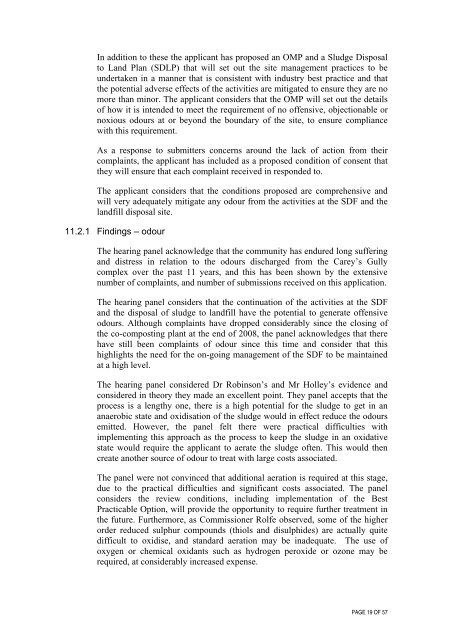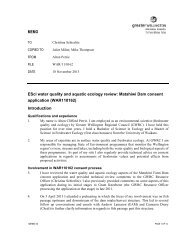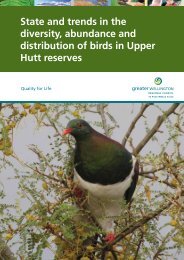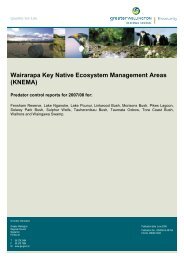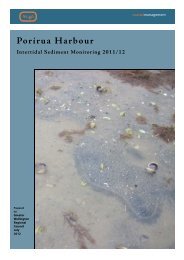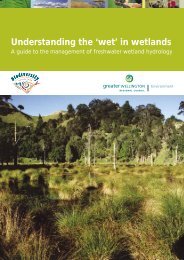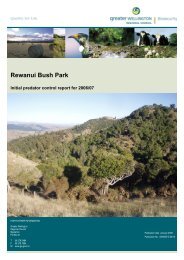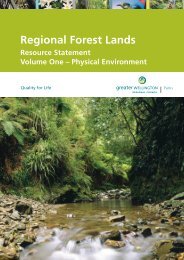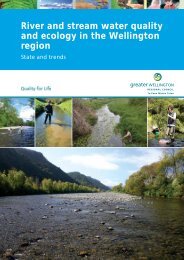Decision report- Carey's Gully Sludge Dewatering Facility - Greater ...
Decision report- Carey's Gully Sludge Dewatering Facility - Greater ...
Decision report- Carey's Gully Sludge Dewatering Facility - Greater ...
You also want an ePaper? Increase the reach of your titles
YUMPU automatically turns print PDFs into web optimized ePapers that Google loves.
In addition to these the applicant has proposed an OMP and a <strong>Sludge</strong> Disposal<br />
to Land Plan (SDLP) that will set out the site management practices to be<br />
undertaken in a manner that is consistent with industry best practice and that<br />
the potential adverse effects of the activities are mitigated to ensure they are no<br />
more than minor. The applicant considers that the OMP will set out the details<br />
of how it is intended to meet the requirement of no offensive, objectionable or<br />
noxious odours at or beyond the boundary of the site, to ensure compliance<br />
with this requirement.<br />
As a response to submitters concerns around the lack of action from their<br />
complaints, the applicant has included as a proposed condition of consent that<br />
they will ensure that each complaint received in responded to.<br />
The applicant considers that the conditions proposed are comprehensive and<br />
will very adequately mitigate any odour from the activities at the SDF and the<br />
landfill disposal site.<br />
11.2.1 Findings – odour<br />
The hearing panel acknowledge that the community has endured long suffering<br />
and distress in relation to the odours discharged from the Carey’s <strong>Gully</strong><br />
complex over the past 11 years, and this has been shown by the extensive<br />
number of complaints, and number of submissions received on this application.<br />
The hearing panel considers that the continuation of the activities at the SDF<br />
and the disposal of sludge to landfill have the potential to generate offensive<br />
odours. Although complaints have dropped considerably since the closing of<br />
the co-composting plant at the end of 2008, the panel acknowledges that there<br />
have still been complaints of odour since this time and consider that this<br />
highlights the need for the on-going management of the SDF to be maintained<br />
at a high level.<br />
The hearing panel considered Dr Robinson’s and Mr Holley’s evidence and<br />
considered in theory they made an excellent point. They panel accepts that the<br />
process is a lengthy one, there is a high potential for the sludge to get in an<br />
anaerobic state and oxidisation of the sludge would in effect reduce the odours<br />
emitted. However, the panel felt there were practical difficulties with<br />
implementing this approach as the process to keep the sludge in an oxidative<br />
state would require the applicant to aerate the sludge often. This would then<br />
create another source of odour to treat with large costs associated.<br />
The panel were not convinced that additional aeration is required at this stage,<br />
due to the practical difficulties and significant costs associated. The panel<br />
considers the review conditions, including implementation of the Best<br />
Practicable Option, will provide the opportunity to require further treatment in<br />
the future. Furthermore, as Commissioner Rolfe observed, some of the higher<br />
order reduced sulphur compounds (thiols and disulphides) are actually quite<br />
difficult to oxidise, and standard aeration may be inadequate. The use of<br />
oxygen or chemical oxidants such as hydrogen peroxide or ozone may be<br />
required, at considerably increased expense.<br />
PAGE 19 OF 57


